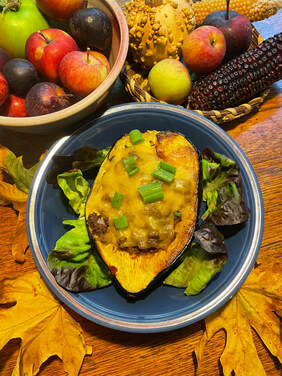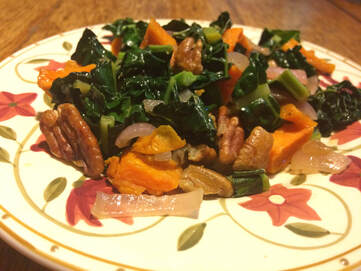|
With colder weather settling in we certainly see more respiratory viruses circling around these days. But we don't have to be sitting ducks! There is so much we can do to strengthen our "Jade Screen"- what in Chinese Medicine we call our defensive Qi, and in Western physiology we call a healthy immune system. Aligning with the seasonal energy by resting and sleeping more really helps bolster one's immune system. Keeping sugar and alcohol consumption in check is also key for this, of course. So is eating whole foods that are rich in immune-strengthening nutrients. We all know about the importance of Vitamin C, but Vitamin A is also one of those key nutrients for strengthening immunity. Grass-fed ghee, butter, and egg yolks are all rich sources of vitamin A (so is liver, if you can hang with eating it, but full disclosure: I cannot!). A precursor to Vitamin A, the antioxidant Beta-Carotene, can be found abundantly in carrots, sweet potatoes and winter squashes. And what do you know, these happen to be some of the main veggies we eat for autumn celebrations! Zinc is another often unsung hero for immune support, and one in which many people are quite deficient. One of the richest food sources for zinc is red meat. I encourage people who are not vegetarian to consider including small therapeutic amounts of pasture raised beef or lamb in their weekly diets, especially in the colder autumn and winter months. A little goes a very long way in terms of nutrient density, and the payoff in immune support is great! It's not only the zinc that makes red meat a wonderful food for this time of year. From the Chinese Medicine understanding of food energetics, red meat is very warming and strengthening of yang qi-- making it a perfect autumn and winter staple. People who run cold, are low energy, and who tend to contract viruses easily can definitely benefit from at least a serving or two of red meat a week to nourish their yang qi, as well as tonify their blood. Other foods that are helpful for immune support include allium vegetables like onions, leeks, scallions and garlic. Pungent white vegetables like these, as wells as radishes, are understood within the Chinese Medical framework to be supportive of lung health and the metal element- both associated with autumn. Lastly, spices like turmeric and ginger are wonderful staples in an autumn diet, as they warm the body, reduce inflammation, and release exterior invasions (also known as viruses) from the body. I'd like to share three of my favorite autumn recipes that feature these immune strengthening ingredients. These recipes are food as medicine: for nourishing the body, strengthening the defensive Qi, and comforting the spirit on a cold autumn day (or night)!  Roasted Butternut Squash and Kale Salad Ingredients: 2 Tbsp. extra virgin olive oil 1 bunch of kale, cut into thin ribbons (I use dinosaur kale, but any kind should work) 1 red onion, thinly sliced 2 Tbsp. unrefined coconut oil or ghee 1 butternut squash, peeled and cut into 1-inch cubes ½ cup pecans, chopped (and lightly toasted to bring out flavor, if desired) 1 tbsp. real maple syrup 1 tbsp raw apple cider vinegar unrefined salt and fresh cracked pepper to taste ½ cup crumbled feta cheese, optional 1.) Preheat the oven to 425 degrees Fahrenheit. Grease a large flat baking pan with the ghee or coconut oil. Add the diced squash pieces and toss with a sprinkling of salt and fresh cracked pepper. Bake the squash for about 30-40 minutes, until tender and slightly browned, but not burnt. 2.) While the squash is roasting, prepare the kale on the stovetop. In a large frying pan, heat the olive oil on medium-low heat. Once the oil is warm, add the sliced onion and saute about five minutes. Add half of the kale, and once that half has cooked down slightly, add the other half, along with 1 tsp. unrefined salt. Saute the whole mixture together for about 10 minutes on low heat, until the kale is tender. 3.) Once the squash is roasted, place it in a large bowl. Add the sauteed kale/onion mixture to the squash, along with the maple syrup and apple cider vinegar. Mix everything together. Add the chopped pecans, and once cooled slightly the feta cheese, if you are using it. This salad can be served warm or cold, and will keep in fridge about three days. Beef Stuffed Acorn Squash 2 acorn squashes, sliced in half and seeds removed 1 tbsp olive oil or ghee 1 diced onion 2 cloves minced garlic 2 diced celery ribs 1 pound organic/grassfed ground beef (can sub with ground turkey of desired) 1 tsp salt ½ tsp dried thyme fresh cracked pepper
Coconut Beef Curry Stew 1-2 Tbsp coconut oil 1 onion, finely diced 2-4 cloves minced garlic 1 inch piece of ginger, minced 2-3 Tbsp curry powder ¼ tsp ground cinnamon 1 tsp unrefined salt 1 pound grassfed ground beef 1 sweet potato, peeled and diced 2 carrots, chopped 1 can of coconut milk 2-3 handfuls of spinach, roughly chopped 1.) Heat the coconut oil in a pan over medium heat. Add diced onion and saute until onion is translucent, about 5 minutes. 2.) Turn heat to low and add minced garlic, ginger, spices, and salt. Stir for 1-2 minutes. 3.) Add ground beef, breaking it up as you stir it into the seasonings. Cook until just browned. 4.) Add the carrots and potato, along with ¼ cup of water. Cover and let simmer 5 minutes. 5.) Add coconut milk and let simmer another 15 minutes, until veggies are tender. 6.) In the last minute of cooking add the spinach and stir until wilted. 7.) Serve this stew in a bowl, with rice, quinoa, or other whole grain of choice if desired-- but I find it satiating enough by itself!
1 Comment
Bonnie Dankert
9/23/2023 07:35:58 pm
Not eating at all right now, but want to put the right food into my body. Am gluten free, low sugar and dairy, and will eat red meat occasionally. I primarily eat fish and chicken with mostly a plant-based diet.
Reply
Leave a Reply. |
AuthorI am a licensed acupuncturist and herbalist with a Heart-centered practice in the Santa Cruz mountains. See my About page for more about me and the work I do. Archives
November 2022
Categories |
Proudly powered by Weebly

 RSS Feed
RSS Feed